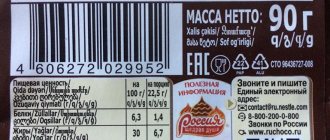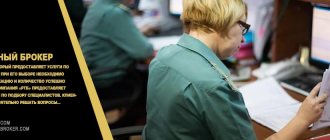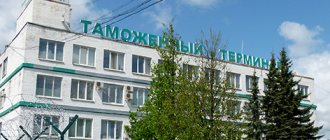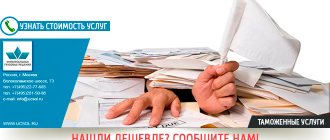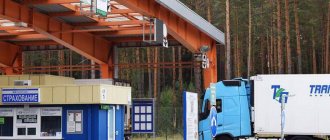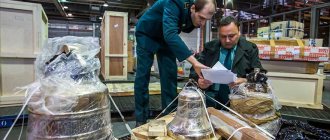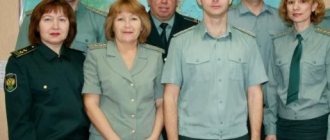Express analysis
100%
Company rating – high
+805 points for positive factors
0 points for negative factors
Positive factors
- Long working time
The company was registered 14 years ago, which indicates stable activity and supervision by government agencies.
- Licenses available
The company has received several licenses, which is a sign of the high reliability of the counterparty.
- Participant in the public procurement system
The company is an official participant in the public procurement system under 44-FZ.
- Contracts as a customer
Signed several contracts under 94-FZ, 44-FZ or 223-FZ as a customer.
- Contracts as a performer
Signed several contracts under 94-FZ, 44-FZ or 223-FZ as a contractor (supplier of goods or services).
- Not included in the register of unscrupulous suppliers
According to the FAS, it is not included in the register of unscrupulous suppliers.
- No connections to disqualified persons
According to the Federal Tax Service, the company’s executive bodies do not include disqualified persons.
- There are no mass leaders and founders
Managers and founders are not included in the registers of mass leaders and mass founders of the Federal Tax Service.
Negative factors
Not detected
Requisites
| OGRN | 1083925999992 |
| TIN | 3906190003 |
| checkpoint | 390601001 |
| Code KLADR | 390000010000047 |
| OPF code | 75104 (Federal government agencies) |
| OKTMO code | 27701000 |
| SDR code | 03351000031 |
| ICU | 13906190003390601001 |
See also information about registration of the KALININGRAD REGIONAL CUSTOMS with the Federal Tax Service, the Pension Fund of Russia and the Social Insurance Fund
Sergey Abrosimov: Most violations at customs occur due to the inattention of citizens
The head of Koltsovskaya customs of the Ural Customs Administration, Sergei Abrosimov, answered the questions of IAA "UralBusinessConsulting".
— Sergey Viktorovich, what is Koltsovskaya customs like today?
What is her area of responsibility, what goals and objectives are set for her? — Our activities are determined by the conditions in which Koltsovo Airport operates.
All goods and cargo transported by air, everything that arrives at the airport and is sent abroad is within our area of responsibility. We carry out customs operations in two directions. The first is the registration of goods that are transported by individuals. The second is the implementation of control over the movement and clearance of goods transported by air transport by participants in foreign economic activity. In November 2013, Russian Post opened an international postal exchange office at the airport. In this regard, a new department consisting of 35 people has been created at Koltsovskaya customs, which processes postal correspondence. Today, the Yekaterinburg MMPO processes postal items, such as small packages, parcels and EMS. In general, the number of officials working at Koltsovo customs today is about 300 people. The largest divisions are customs posts, passenger and cargo. We also have divisions that carry out economic, operational and law enforcement activities. Today, Koltsovskaya customs is one of five aviation customs based at Russian airports. Three in Moscow, one in St. Petersburg. — What are the main performance indicators of Koltsovo customs?
— The volume of work is very large and is constantly increasing.
This year, about 2 million passengers have already been registered. Moreover, in recent years we have seen an increase in passenger traffic by 20% annually. Unfortunately, this year the growth rate on international routes has decreased slightly and amounted to about 5%. As for cargo that moves through the airport from abroad, the main indicators this year remained at the level of last year, with no significant growth observed. In 2013, we transferred about 4 billion rubles to the budget. This year we are moving at about the same pace. If we look at the numbers, in the first half of 2014 the foreign trade turnover in the area of operation of the Koltsovo customs office amounted to $311.2 million. Imports amounted to 78.9% of foreign trade turnover (USD 245.4 million), respectively, export supplies accounted for 21.1% of the total trade turnover (USD 65.8 million). Compared to the first half of 2013, trade turnover increased by 25.5%, and cargo turnover by 0.4%. The number of completed declarations for goods increased by 7%, and the number of participants in foreign economic activity - by 2%. — What groups of goods are imported into our country by air?
— As a rule, these are either expensive goods, the cost of transportation of which is insignificant compared to their value, or perishable goods.
The main groups of declared goods are consumer goods, flower products and complex expensive equipment. It is from the import of these goods that the main payments are transferred to the budget of the Russian Federation. — In which segments are the most violations observed?
— Organized carriers handling large volumes of cargo commit violations relatively rarely.
Most of the offenses are committed by individuals. The most common of them are the transportation of goods for sale under the guise of things for personal use, as well as the import of food products without permits established by the legislation of the Customs Union. Regarding counterfeit products, every year we consistently initiate 3-4 administrative cases. In 2014, the court has already considered 6 cases, 4 of which have been transferred from 2013. The circumstances of all such cases are similar, namely: persons moved goods for commercial activity across the customs border of the Customs Union, on which there were images of the trademark. Trademarks are included in the register of intellectual property objects of the Federal Customs Service of Russia. The copyright holders and representatives of the copyright holders did not enter into agreements with the indicated persons on the use of these trademarks. All court decisions in these cases were made in favor of customs. Resolutions in cases of administrative offenses of this category were not appealed, and no acts of prosecutorial response were issued. It is important to note that all cases of counterfeiting were initiated against individuals. The last time an administrative case was initiated against a legal entity was in 2009. Considering the intensification of the work of the Koltsovo customs to combat counterfeit products, as well as the systematic publication in various media of information from customs authorities about the measures taken to protect intellectual property rights, participants in foreign economic activity are becoming more careful in choosing purchased goods and trying to comply with the legislation of the Russian Federation on intellectual property, and participants Foreign trade operators, previously brought to justice, no longer allow new violations in this area. As an example, we can talk about one of the largest such deliveries: a Chinese citizen tried to import more than 20 thousand Adidas brand thermal stickers, which could be used in the production of counterfeit clothing. A large consignment was also detained - more than 4.5 thousand pieces of stickers for household and computer equipment with the logo. — How do customs authorities identify consignments intended for sale, and how do you distinguish them from items for personal use?
Where do such consignments and counterfeit products mainly come from? — As a rule, differences are easy to detect visually, using technical control tools.
The equipment that our posts are equipped with allows us to track passengers with large luggage even in the “green corridor” and control it using X-ray scanning. For example, if we see that a suitcase contains 50 sports suits in factory packaging, then we have well-founded doubts that the citizen is carrying them for personal use. Especially if they are stacked and well compressed. If we talk about the directions of such smuggling, then these are mainly China and the countries of Central Asia, from which Chinese products are also imported. It is clear that a tourist who went to see Europe, of course, brings some goods with him. But in this direction there are no large quantities of goods being imported. — What violations are the most widespread?
— Most of the offenses identified by our customs are associated with the inattention of citizens, their ignorance of the laws and rules of customs regulation.
Thus, one of the most common administrative offenses at our customs is the import or export of undeclared amounts in excess of 10 thousand US dollars per person in equivalent at the Central Bank exchange rate on the day of crossing the border. For the most part these are minor violations. Of course, there are also unique cases. Thus, in the fall of 2013, a man from Kyrgyzstan imported about $3 million in cash and tried to cross the customs border. This year a trial took place, and all funds were transferred to the budget of the Russian Federation. At the same time, I would like to especially note that there are no restrictions on the import and export of cash currency. You can bring any amount, you just need to declare it. The process takes a few minutes and saves you a lot of time, nerves and effort. In addition, it should be noted that expensive goods must be declared. In general, a passenger entering the country by air has the right to import into the territory of the Russian Federation duty-free goods worth no more than 10 thousand euros. I note that by other means of transport you can import goods duty free for only 1,500 euros. For amounts exceeding 10 thousand euros, you must pay an import duty of 30% of the customs value, but not less than 4 euros per kg of weight. You can do this right at the airport. — How is explanatory work with citizens organized?
“We are doing everything possible to convey this information to passengers. The website of the Federal Customs Service has all the necessary information, including a list of goods prohibited for movement across the customs border. The airport is equipped with interactive screens with background information. There are information boards in front of the entrance to the customs control zone. The telephone numbers of the legal department are also located there, where they are always ready to advise citizens on all issues of interest to them. Moreover, in front of the customs control zone we have a customs inspector who is ready to answer everyone’s questions before they cross the line beyond which the customs control zone begins. All cases of administrative offenses are mainly related to the fact that passengers, having the opportunity to ask questions to specialists and declare money or goods, did not do so.
Return to section » Articles
Contacts
| Address | 236016, Kaliningrad region, Kaliningrad, st. Artilleriyskaya, 26, building 1 On the map |
| Phones | +7, |
| Fax | +7 |
| [email protected] | |
| Web site | customs.ru |
| Is your contact information out of date? If you are related to the KALININGRAD REGIONAL CUSTOMS and know the exact contact details of this company, please share them. Edit contacts | |
RuGrad.eu
Head of the Kaliningrad Regional Customs Sergei Abrosimov about what customs can do for regional business now and why rolling back customs legislation 20 years ago is no longer relevant.
Sergey Abrosimov will head the Kaliningrad regional customs in the fall of 2021. He replaced Alexander Kochnov in this post, who led the department without fail for almost eight years. During the first year of service in the region, Abrosimov noticeably updated the service's management team and received the rank of major general.
Abrosimov is not a supporter of the destruction of sanctioned products and believes that in the arsenal of the head of the regional customs there are actually no mechanisms to “close” legal businesses within the region, to prohibit them from importing or exporting products. At the same time, customs does not create conditions for business, but only implements adopted laws, Abrosimov emphasizes. In an interview with RUGRAD.EU, he talks about what customs can do for regional business now and why rolling back customs legislation 20 years ago is no longer necessary.
— You moved to the leadership of the Kaliningrad Regional Customs from the position of Deputy Head of the Ural Customs Department. The load on the customs service in the Urals was probably higher; does work in the region seem too calm?
— If we talk about the volume of payments, then yes, the load was higher. If we talk about the volume of documentary work, then the load is comparable. If we consider the issue in terms of checkpoints, then in the Urals already at the time when I served there, since the formation of the Customs Union, except for air checkpoints and the relatively recently opened “Sabetta” sea checkpoint in the north of the Urals Federal District.
In the region of activity of the Kaliningrad Regional Customs there are 21 customs posts.
There are a huge number of them here compared to the Urals, and we hope that the launch of the international checkpoint “Dubki” is being prepared, which will significantly change the situation.
It’s not boring here: if it were the other way around, then I would sit and collect information and do analytical work. I can make an assessment of how the region is developing in comparison with other regions; I know that this subject is given great attention by both the government of the Russian Federation and the regional government headed by Anton Andreevich [Alikhanov]. Progressive development, investments, everything is being built.
There is no “safe haven” here, there is a lot of work here, because this entire harbor is the territory of a free economic zone.
— A free economic zone, from which, year after year, according to business, economic freedom is being “plucked off.”
Here is the “Problem 2016” - with the return of export duties when sending goods to Russia, and the related issue of identifying goods.
How would you currently assess the level of business-friendliness in the region? - I'll start from afar. I heard that with the formation of capital in the Kaliningrad region, everything was not very simple, and often, in previous years, businesses did not turn to customs at all in order to legally register the import and export of goods. This is to put it mildly.
No identification processes were carried out at all. Products appeared, were written off for production, and were not actually used. Well, business has its own rules for making money and optimization.
No identification processes were carried out at all. Products appeared, were written off for production, and were not actually used.
I'm not saying it persists.
But now we must identify goods; it is regulated by law. I know that the regional government correctly makes proposals to improve legislation, including proposing amendments to the administrative code. Rail transport and road transport travel through third countries, and the law creates conditions that exclude the substitution of goods on the territory of third countries. Business knows more about this. The current situation does not mean that we need to rewind business conditions 20 or 30 years ago. I am not a supporter of such measures. But the discussion about changing identification rules continues at the level of the regional government and the Russian government. We are involved in it as executors of the laws. We are interested in ensuring that business operates honestly. For this, customs must work honestly, in accordance with laws, regulations and orders. I can't get ahead of business.
If we talk about the extent to which the special economic zone has been preserved, then I will note that, according to operational information, the expected reduction in the volume of federal subsidies for compensation of customs duties paid did not occur in 2021. I would rate the favorable regime for business in terms of customs procedures as being in compliance with federal legislation.
If a business believes that somewhere the process is going slowly or there are complaints about improper actions of officials, then we have a website and a helpline (8 (4012) 609-355. — Ed. note.
), which always work. Over the past two years, there were a lot of requests at the beginning, because there was probably a certain transition period when the previous manager retired and there was no appointment for some time.
During my stay in the Kaliningrad region, I, together with the team, must remove any costs associated with administration time.
My personal opinion is that during my stay in the Kaliningrad region, I, together with the team, should remove any costs associated with administration time so that this background does not exist: customs works slowly.
We are obliged to do everything that can be done within the framework of the legislation of the Russian Federation. Everything else - our actions, including those controlled by the central apparatus of the Customs Service, we are corrected, acts are issued, in accordance with which we eliminate minor shortcomings.
It is gratifying that businesses are requesting to visit enterprises and see how the real sector works. I think that the pandemic will subside to some extent and representatives of the electronic declaration center will return to this practice again. After all, they come to the enterprise with the understanding: we provide a certain income to the Russian budget, but if there is no business, nothing will flow into the budget at all.
—
Do the Kaliningrad Regional Customs and you, as its head, have the right of an advisory vote when the regional government prepares initiatives for amendments to legislation related to customs procedures, when the Ministry of Finance or the central office prepares projects that directly affect work in our region?
Can you provide feedback and say, “No, this will make the situation worse”? - We are doing this. I can’t talk about specific examples until the final decision is made. But on July 2, Order No. 27-n came into force, and less than two weeks have passed since the regional government and the business ombudsman turned to the Russian government, and a new version of this order is now being discussed. Therefore, if business is interested, then Russian legislation changes much faster than if we write from our side how difficult it is for us to work. Yes, if it’s difficult for us to work, we contact them and they can improve the software product, but we don’t write the laws. We fulfill them.
— When restrictions related to COVID-19 began in the spring, we heard quite
positive feedback from the business community about the work of the Kaliningrad Regional Customs.
What was so special done during this period, if everything remained within the framework of existing laws? — What has changed due to the pandemic is the number of individuals and cars that cross the border of the Russian Federation. The employees who controlled this direction were freed, we transferred them to control cargo directions.
People are freed and we control cargo much faster.
People are freed and we control cargo much faster.
We sent additional forces to control the cargo. Taking into account COVID-19, I toured all the points and saw that all officials were following all the requirements of Rospotrebnadzor in order to prevent the risk of infection for both our people and colleagues from related industries, including employees of transport companies. Some morbidity and the need to take anti-epidemic measures distract us from the routine of work and allow us to remember that our lives are not only about work. People's health is more important. By taking care of this, you understand: if you save people, the work will get done. The work will be done - the business will not stand still.
— So this is a lesson in relation to human capital?
- Yes. Business is also being restructured, everyone is doing the same and trying to protect the health of their employees and others. Considering that the pandemic entails negative consequences for business, we did everything to eliminate temporary costs. There was no need to give additional instructions; everything was already prescribed by law: in decisions of the leadership of the Federal Customs Service, orders of the government and the head of state. If you implement them promptly, it will be easy for your business to operate.
Even not during a pandemic, if the need arises, the business writes an appeal, and we get involved, we can extend the working day. We understand that if a project is being built, then equipment must be delivered quickly, we can stay and process it outside of working hours, subsequently compensating officials for the rest. This was the case when construction materials were transported as part of the reconstruction of the city of Gusev: large volumes, contractors, subcontractors, it was necessary to ensure completion on time. In other areas it’s the same.
— Such an area as waste disposal and removal of recyclable materials.
of lifting restrictions on the export of industrial waste , recyclable materials and goods made from recyclable materials in the region
has been widely discussed Do you agree that this situation can be called the “final solution” to the garbage issue? - No, nothing is perfect. The issue of recycling waste, both industrial and household, will be very pressing. We would be very interested in the processing of these goods being carried out in the Kaliningrad region. Control functions are regulated by law, and we carry out everything that has legal force.
Now a specific enterprise has won lawsuits regarding specific deliveries. But the court decision did not change the legislation. The court's decision is the law, we abide by it. But you need to understand that issuing a court decision for each delivery is a very serious cost for the enterprise, including paying for lawyers and attorneys.
— So now
the company that makes frames for license plates and that was at the forefront of legal cases with the Federal Customs Service has no problems?
What about other businesses? — The company you named actually settled the issue in court. The hazard class of the waste they use in production does not require licensing. If we are talking about the use of other, more hazardous waste, then such enterprises are subject to state licensing requirements. Now we cannot allow negligence and allow the removal of waste to enterprises that to some extent violate the law and operate without a license.
I repeat that I myself am on the side of waste recycling in the Kaliningrad region.
I repeat that I myself am on the side of waste recycling in the Kaliningrad region.
If a business that is interested in transporting waste wins in terms of changing legislation, then this will be a loss for the economy of the Kaliningrad region.
It is clear that business is interested in further reducing costs, this is its right. If the government agrees to this and changes these requirements, then we will fulfill them.
— In July, a redistribution of powers of customs authorities took place; some operations with a fairly wide range of goods were transferred to
the Central Excise Customs .
At the moment, can you present the customs issue in its entirety to the leadership and population of the region, or is there still a separate commissioner for excise customs affairs? How does it work? — I can say unequivocally that thanks to the strategy of digitalization of customs processes, there will be no costs for business in connection with these changes. Now there are certain issues, but they are being resolved in a working order. No one needs to travel to Moscow in person; documents are sent in digital form via the Internet. The same order determined that the goods must be physically delivered to the excise post in Bagrationovsk. Actual control is carried out by officials of the Kaliningrad Regional Customs.
In the government’s understanding, these changes were made for one purpose: it is necessary to remove the interaction of customs from the business at its location. It is easier to control one Central Excise Customs than many excise customs posts. In the country as a whole, this division leads to some reduction in the costs of government agencies. First of all, I think this leads to budget savings.
But we must understand that these changes were not made for certain categories of business to receive excess income. And if there are discrepancies between what is declared for import and what is actually imported, we will stop such violations.
But we are waiting for changes to order No. 27, and I believe that the government will make the right decision and it will be easier for business to work.
— What is happening now in Belarus is reflected promptly in the customs process - the release of Kaliningrad goods in transit? Has the flow of Belarusian cargo itself changed?
— Nothing has changed in the Kaliningrad region. We will gladly accept cargo that arrived through the territory of the Republic of Belarus, through the territory of Lithuania.
It is clear that such Belarusian giants as BelAZ have competitors in the European Union and few people benefit from maintaining this enterprise. Therefore, everything with trade turnover will be fine if third countries do not apply any special sanctions to Belarus.
By the way, about sanctions: Russian restrictions on the import of European food products have been in force since 2014, however, “Spanish tomatoes” do not escape either customs reports or, obviously, retail chains. Why is this so?
They bring goods of European origin for sale in the Kaliningrad region for one reason - it is profitable. In Europe there is an overproduction of agricultural products, and producers are ready to do anything to export them. We just need to remember that by importing foreign food products here, we are not feeding our own economy.
It is clear that if the notorious Spanish tomatoes were traveling directly from the EU countries, they would not have gone through customs procedures. But if they arrive through the territory of the former Soviet republics, including Lithuania, then the situation is more complicated.
I think that everyone who owns such a business was born in the USSR and has family and friendly ties. Therefore, delivery according to documents from Lithuania and other Baltic republics may be correct, but according to goods - not.
Delivery according to documents from Lithuania may be correct, but according to goods - not.
Again, in Belarus there is no ban on the import of vegetables from the European Union.
And I’m not saying that this is how everything happens, but, for example, a shipment of Russian vegetables, according to documents, is loaded with goods that have passed customs control in Belarus, and if all the labels are removed and replaced, then they will reach Kaliningrad. But if we see frankly “Spanish tomatoes” being imported, then we return the shipment if the vehicle is, for example, Lithuanian. If the cargo is imported in a car with Russian license plates, then we file administrative cases and confiscate it for destruction in the prescribed manner. I cannot say that I am a supporter of this approach. However, if such cargo is identified, we deal with it strictly according to the law.
I can say that the region’s retail industry is not interested in its own trucks falling into the category of such offenders, because in the future all transport of this enterprise will fall under 100% control. But we are faced with the fact that such violations are committed by individual entrepreneurs who carry out transportation in the interests of legal companies.
— But do you agree that products from EU countries are penetrating trade and
are quite accessible in the city?
— Of course, to some extent it is represented both in Kaliningrad and in markets in the region. When I buy farm products myself, I see goods of unknown origin on the counter. Although now they are sold in packages. If there are specific examples, we are ready to promptly cooperate.
We entered large markets and brought products from there. And we are ready to do this again and take additional steps if we again receive evidence that business does not hear either us or the governor. Then, in addition to working within our usual framework - on the declaration and control of goods - we will move on to customs control after release. This is not our main task, and such work should be carried out on the domestic market in cooperation with Rosselkhoznadzor and Rospotrebnadzor, but there are legal mechanisms for this.
— There is a belief in the region that the tax service and customs are one of two government bodies that can “close” any branch of production at any time. The Federal Tax Service has the ability to block accounts, and customs can prohibit the export or import of products into our territory. Do you agree with this assessment?
- I don’t agree. This is absolutely not in the competence of the manager. I have no bias towards legal businesses. Recommendation to those involved in illegal business: stop.
I have no bias towards legal businesses.
And legal business - God grant that they work, earn money and create jobs.
Here the priority is to anticipate offenses whenever possible. If we suspect that a business may violate the law, we would rather hold a meeting and issue a warning. Or some new investment project is born, we are always in touch with the Minister of Economic Policy and Trade Dmitry Kuskov and are ready to provide everything so that the supply of equipment does not encounter problems at customs if the organization does not have experience. Even this week we met and found out what new things will be built and what will be imported. So, we found out about a plant for the production of solar panels.
—
It is impossible not to notice that after the change of leadership of the region, the leadership of representatives of all law enforcement agencies was renewed here.
Including the Kaliningrad regional customs office. Would you like to participate in the development of the region for as many years as possible? - By decision of management. Since 1983, I have been under oath, and when an order comes, I am ready to carry it out at any moment. My career issues are a management decision.
“We know so little about the life of the generals.” Having such a title, do you have the opportunity to submit an application, petition, or express your opinion on the issue of relocation?
— When I was appointed to the Kaliningrad region, and earlier for other positions, there was always an offer.
If a manager sets certain tasks, I never said that I couldn’t cope. If the proposal took place, this means that a solution has been reached. The right to agree or not is guaranteed. My rules are to answer an order: “Yes” and go and carry it out. Text: Maria Pustovaya Photo: Yulia Vlasova
Types of economic activities
Main activity
| 84.11.4 | Financial and tax management |
Licenses
1. License No. FS-39-01-000749 dated November 27, 2012
Kind of activity
Medical activities (with the exception of the specified activities carried out by medical organizations and other organizations included in the private healthcare system in the territory of the innovative)
Licensing authority
Office of Roszdravnadzor for the Kaliningrad region
2. License No. AN-39-000139 dated April 16, 2019
Kind of activity
Activities for transporting passengers and other persons by buses
Licensing authority
North-West MUGADN Kaliningrad Department of Motor Transport and Road Supervision
3. License No. 77.99.15.002.L.000206.06.06 dated June 15, 2006
Kind of activity
Activities in the field of use of ionizing radiation sources (generating) (except for the case if these sources are used in medical activities)
Licensing authority
Federal Service for Supervision of Consumer Rights Protection and Human Welfare
